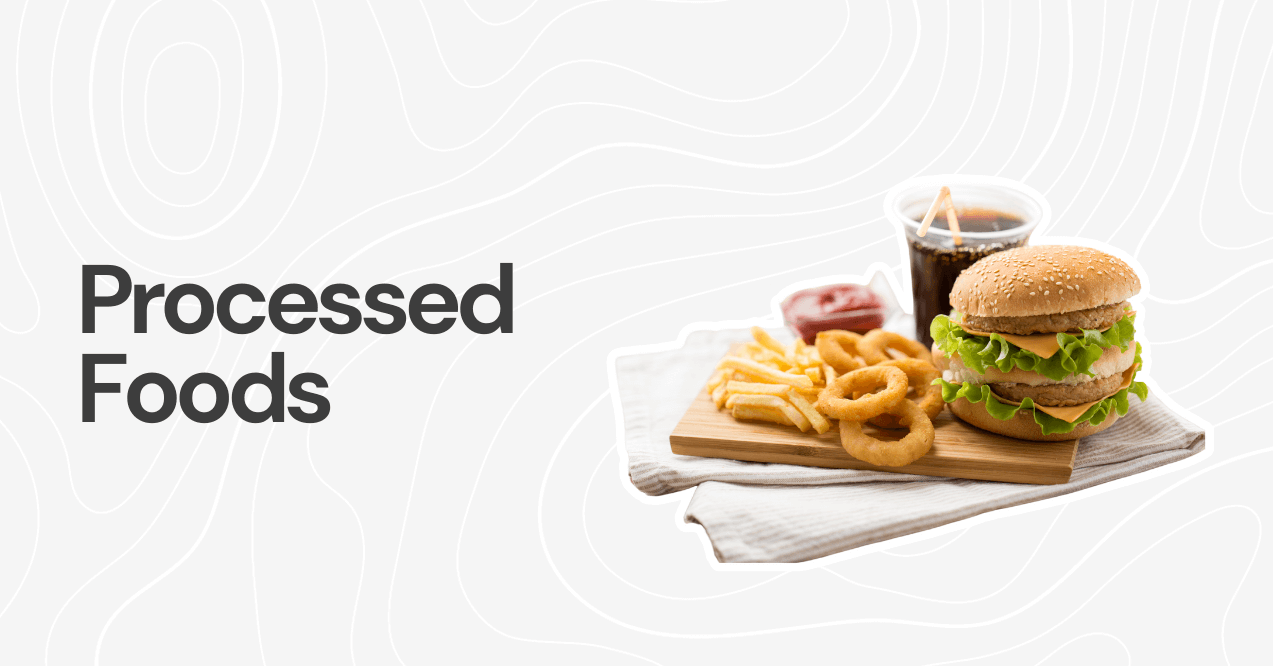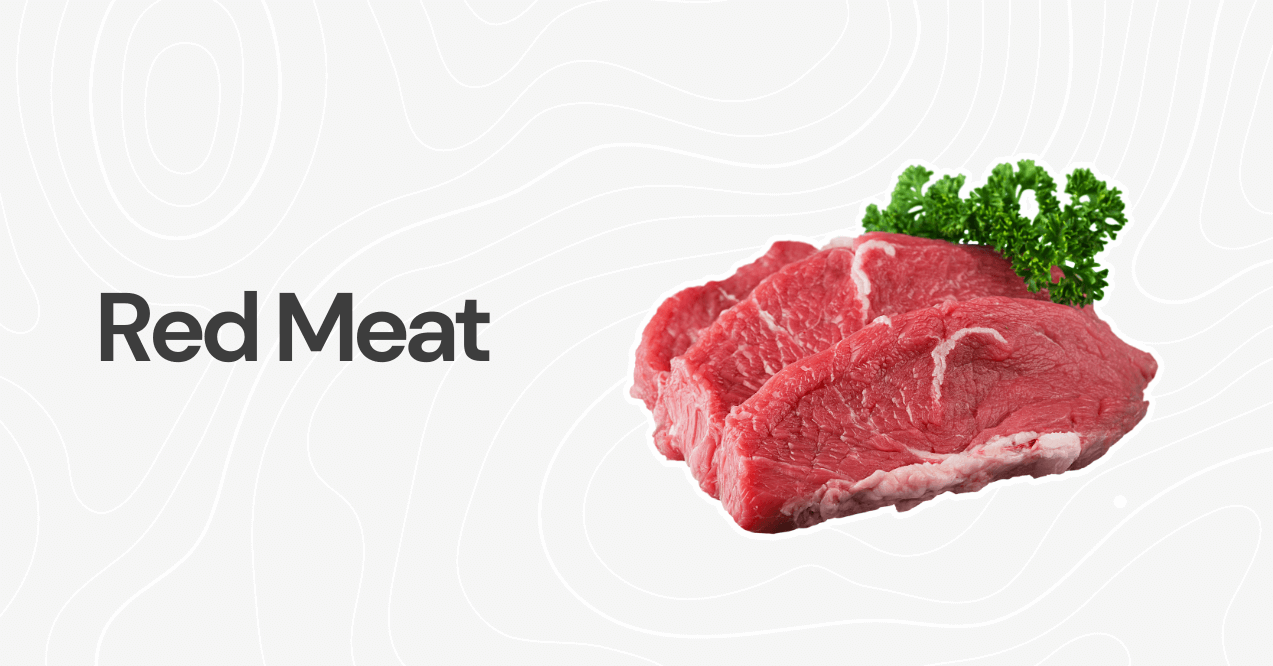7 Worst Foods for Gut Health
The worst foods for gut health are like sneaky troublemakers hiding in your favorite comfort dishes. The gut is highly influential in your overall health, and you should take proper care of it if you want to remain healthy and strong. This powerful microbiome hub does much more than just digest your food. It affects your energy levels, nutrient absorption capabilities, overall vitality, and ability to manage weight. It also impacts your immunity and mental health. That is why we also recommend reading about our best smoothies for gut health!
Picture your gut as a bustling ecosystem run by a ton of beneficial microorganisms. These good bacteria hold the fort and maintain a delicate balance. However, what you eat can significantly influence whether your gut functions properly or experiences chaotic disruptions. Some foods are not doing you any favors and can cause total mayhem in your entire system. It’s vital to know which ones to avoid so that you can keep your gut operating like clockwork.
To help nourish your gut and maintain optimal health, consider incorporating superfood powders into your diet for added nutrients that support a balanced microbiome, and performance supplements to boost energy and recovery. For those balancing gut health with a fasting routine, our intermittent fasting calculator can help you plan a meal schedule that supports a healthier microbiome.
In this article, we will explore the most harmful foods for your gut and the primary reasons they are bad for you. So buckle up and read on. Prepare to uncover the secrets your go-to meals have been keeping and discover how to nourish your gut microbiome properly for a happier, healthier you! Additionally, if you’re interested in supporting your gut health proactively, check out our guide on the Best Vitamins for Gut Health.
Key takeaways:
The Influence of Different Foods on Your Gut
As previously mentioned, your gut plays host to a multitude of microorganisms, both harmful and beneficial, that aid in its various functions. This microscopic army consists of fungi, bacteria, and viruses, and your gut has a clever way of balancing them to ensure a smooth operation. Several foods and supplements, including the best vitamins for gut health, have the potential to keep this bacterial ecosystem running as it should. They work to bolster the microbiome’s equilibrium, enhance the working of enzymes, and promote gut health.
On the other hand, some not-so-healthy foods can disrupt this delicate balance, leading to various consequences for overall health. When consumed excessively and too often, they can damage the gut lining, increase the populations of bad bacteria, and cause numerous inflammatory reactions.
Worst Foods for Gut Health
What you eat on a daily basis can make or break your gut health. Making the right dietary choices will help you maintain a nice environment along your digestive tract, causing your microbiome to grow and thrive. Conversely, consuming the worst foods for gut health will negatively affect your body and may cause severe issues down the line. These meals contain harmful components and additives that affect the growth of your gut microbiome. Additionally, some can be rather hard to digest, leading to inflammation, gastrointestinal problems, and lots of discomfort.
Unfortunately, most of this food is pretty affordable and readily available at your nearest eatery. Still, it’s vital to be cautious about what you choose to put in your body, as low-quality options can negatively impact your well-being and contribute to various health concerns. So, what are the worst foods for gut health? Here’s a list of the meals you should avoid like a pest if you want a happy belly and a healthy body.
1. Fried Foods

Enjoying the crispy and tempting goodness of fried foods is a popular delight. However, you should consider their impact on our health. The sizzle of these delectable treats conceals a concerning truth: they often soak up copious amounts of oil during cooking, resulting in an unwelcome surge in calories and fat. These dietary menaces conspire to stealthily pave the way for weight gain and potential gut-related woes. It’s important to be mindful of the frequency and portion sizes of fried foods in our diet to support overall health and wellness.
The extremely high temperatures used for frying create harmful compounds called advanced glycation end products (AGEs), which can lead to inflammation and increase your risk of chronic illness. These issues can affect the balance of gut bacteria, causing a variety of gastrointestinal issues. In addition, although they may be tasty, some of the oils used for frying are also not good for the gut. For example, cooking food with industrial seed oil will degrade and produce byproducts that may cause health problems.
But the troubles don’t end there. Many plant-based cooking oils are high in omega-6 fatty acids which, while not inherently harmful, pose an inflammatory threat when consumed in abundance and too frequently. High intake of omega-6 fatty acids has been associated with a noticeable increase in the risk of arterial pressure numbers if you have underlying conditions like impaired blood sugar metabolism. In addition, they are known to boost triglyceride levels, augmenting the risk of heart disease and dangerous brain clots.
2. Alcohol

Fancy drinking alcohol at social gatherings or at home with friends? Unfortunately, regular alcohol consumption can have adverse effects on your gut health. It can reduce the amount of good bacteria in your gut and damage the lining, which can disrupt your gut microbiome. This condition, known as dysbiosis, can cause inflammation and digestive problems, leading to unnecessary discomfort in the long run. Additionally, drinking too much alcohol can result in other health issues like alcoholic liver disease, heart problems, increased arterial pressure, and a weakened immune system
Moreover, alcohol consumption can cause oxidative stress, potentially leading to a condition called “leaky gut.” This ailment allows harmful substances to enter the bloodstream, inevitably triggering an immune response. In addition, alcohol metabolization creates a byproduct known as acetate. The liver is responsible for naturally producing this substance, which then travels to the intestines, where it serves as a source of carbon for bacterial growth. However, excessive levels of acetate can lead to an imbalance in bacterial growth, further contributing to gut imbalances.
3. Dairy

Dairy products can contain sugars and proteins that can harm your gut. Lactose is one of the sugars that can be difficult for some to digest. If your gut cannot produce enough lactase enzyme to break down the lactose into a form that can be absorbed into your body, you may experience lactose intolerance. This can lead to digestive issues such as stomach discomfort, bloating, gas, and diarrhea.
Casein is a prominent compound found in dairy products. Consuming this protein can stimulate immune responses, leading to inflammation, indigestion, and stomach discomfort. Moreover, some individuals might experience sensitivity to other dairy proteins that are typically considered safe for consumption. Sometimes, these sensitivities can result in discomfort, rashes, and digestive problems.
But do not throw all dairy products away just yet! Consuming fermented milk, kefir, and yogurt in moderation provides essential probiotics that may support gut health by increasing the good microbiome. In addition, breast milk is an excellent nutrition source for babies and toddlers aged two and beyond, according to the World Health Organization.
4. Processed Foods

You know those pre-packaged goodies that taste oh-so-good? Well, it turns out they might not be the best buddies for your gut and overall health. They often come loaded with tons of added sugars, not-so-great fats, and a bunch of additives. Those ingredients are usually thrown in for flavor or during the whole making process. But here’s the kicker: They can mess with your gut harmony, giving the upper hand to harmful microorganisms. They can even kill the good guys in your belly, causing severe issues like excess weight gain, heart problems, impaired blood sugar metabolism, tummy troubles, and more.
Bacterial imbalances in your gut caused by processed foods can also lead to allergic reactions, disabling you from enjoying some of your go-to meals. In addition, it could stop some of your trusty bacteria from doing their digestion dance, bringing on indigestion, stirring up some inflammation, and haltering your ability to absorb essential nutrients. Ultimately, this issue can impact various bodily functions, including metabolism, immune response, digestion, and cognitive health.
5. Sugary Drinks

Consuming your preferred sodas and fruit juices in excessive amounts can lead to an increase in harmful bacteria, which can disrupt the balance of your gut. These changes in the composition of your gut microbiome can potentially cause various health issues. For example, they can increase the risk of inflammatory bowel disorders(IBD) and several other metabolic conditions.
If you consume sugar-sweetened beverages along with a high-fat diet, you may also suffer from gut inflammation, damage to the lining, excess weight gain, and submucosal edema. Studies suggest that the gut contains a significant amount of IBD-prone harmful bacteria. Consuming these drinks can exacerbate their growth, leading to the activation of targeted immune responses.
Artificially sweetened drinks are as bad as those that use natural sugar. When the body tries to metabolize them, it can trigger several metabolic disorders. In addition, laboratory tests performed in mice show that this sugar causes the loss of vital immune cells. As a result, they can mess up your immunity, which may open the door to several unrelated illnesses and pathogenic attack.
6. Fructose

This particular type of sugar occurs naturally in fruits. However, in processed foods, manufacturers often use it in excessive amounts, surpassing the recommended daily limit. Consequently, individuals who frequently consume such goodies often find themselves exceeding their recommended sugar intake.
Expectant mothers who indulge in sweet cravings during pregnancy may unknowingly trigger gut issues that could be inherited by their offspring. The consumption of fructose may lead to modifications in the mother’s gut microbiome, which can then be passed on to the child. As the child grows, they might face gut dysbiosis and related metabolic disorders, while the pregnant mother may encounter challenges in managing her weight. Furthermore, excessive fructose consumption could potentially worsen the effects of gestational blood sugar disease.
Fructose also disrupts the balance of gut microbiota and contributes to heightened intestinal inflammation, which is closely linked to conditions such as colitis. Those affected might experience symptoms like pain, diarrhea, and the presence of blood in their stool.
7. Red Meat

Red meat is a popular delicacy among many people. However, regular consumption is terrible for your gut. First, red meat may release inflammation-causing byproducts during digestion. These toxins include N-nitroso, which damages the lining of the bowel and can lead to malignancies. People with damaged gut linings may have problems digesting other foods, irritable bowel syndrome, and other gut problems such as bloating.
High red meat intake has also been known to cause cardiovascular conditions. Some of the byproducts from its digestion seep into the bloodstream and cause problems within the circulatory system. One particularly harmful compound is called TMAO (trimethylamine N-oxide), which increases the risk of both kidney and heart problems.
Did you know that some folks can actually develop a beef intolerance or even a full-blown red meat allergy? Often, this kind of condition crops up after a not-so-friendly encounter with a lone star tick. If you’ve got this allergy, red meat should be on your no-no list. Why? Well, digging into that burger might lead to a congested nose, runs to the bathroom, a sudden drop in arterial pressure, sneezing fits, or even a super serious reaction like anaphylaxis.
But that’s not the end of it. Red meat can also be the trigger behind autoimmune issues for folks with a weaker immune system. Conditions like patches of scaly skin, inflammatory bowel disorders, inflammatory joint arthropathy, and even chronic deterioration of the central nervous system might get stirred up by chomping down on that steak.
Recommendations for Improved Gut Health
A thriving gut plays a crucial role in overall well-being. To bolster gut health:
- Diversify your diet with vegetables, nuts, seeds, fruits, whole grains, and legumes. A varied diet supports different microbiome colonies.
- Include high-fiber foods like unprocessed grains (preferably gluten-free), legumes, and whole fruits for improved digestion.
- Favor fermented foods such as yogurt and kimchi, which increase beneficial microbiome.
- Choose natural foods free from additives and remember to hydrate sufficiently.
- Add prebiotic-rich foods like asparagus, onions, and garlic. By including them in your gut health recipes , you promote beneficial bacteria as well as offer essential minerals.
- Integrate premium quality organic trumeta powders, such as trumeta metabolic greens and Metabolic Reds, into your diet for nutrient diversity and optimal gut support.
- Manage stress through techniques like deep breathing and meditation.
- Engage in regular exercise to aid digestion and bowel function.
Incorporating these practices can significantly enhance gut health and overall wellness.

Conclusion
Navigating the intricate relationship between our diet and gut health is crucial for our overall well-being. Here’s a succinct wrap-up:
The Gut’s Importance: Your gut is pivotal to your overall health, impacting energy, nutrient absorption, weight management, immunity, and mental well-being.
Food’s Influence: The foods you consume can either support a healthy gut microbiome or disrupt it, leading to digestive and overall health issues.
Top Offenders: The worst foods for gut health include fried foods, alcohol, dairy, processed foods, sugary drinks, fructose, and red meat. New research also demonstrates that gluten is harmful to the gut lining of all humans. These can trigger inflammation, imbalance gut bacteria, or release harmful compounds during digestion.
Recommendations to Promote Gut Health:
- Diversify your diet with whole foods (organic whenever possible).
- Incorporate high-fiber foods.
- Prioritize fermented foods.
- Stay hydrated and reduce processed food intake.
- Incorporate prebiotic-rich foods.
- Use organic trumeta metabolic powders for added gut support.
- Manage stress and engage in regular exercise.
For optimal health, it’s crucial to be aware of the foods that can harm the gut and prioritize those that nourish it. By understanding and making informed choices, you can keep your gut in top shape, benefitting your overall well-being.
Enjoyed the article? Check out another recent one about the best gut detox options!
Fried foods, processed foods, sugary drinks, alcohol, red meat, and excessive fructose can negatively impact gut health. These foods disrupt gut bacteria balance, increase inflammation, and can harm the gut lining, leading to various digestive issues.
Processed foods often contain added sugars, unhealthy fats, and additives that disrupt gut microbiome balance, promote harmful bacteria growth, and lead to inflammation, digestion issues, and nutrient absorption problems.
Yes, regular alcohol consumption can harm gut health by damaging the gut lining, reducing beneficial bacteria, and contributing to inflammation, which can lead to digestive discomfort and long-term gut imbalances.
Advertisement. This site offers health, wellness, fitness and nutritional information and is designed for educational purposes only. You should not rely on this information as a substitute for professional medical advice, diagnosis, or treatment. If you have any concerns or questions about your health, you should always consult with a physician or other health-care professional. Do not disregard, avoid or delay obtaining medical or health related advice from your health-care professional because of something you May have read on this site. The use of any information provided on this site is solely at your own risk.
Advertisement. This site offers health, wellness, fitness and nutritional information and is designed for educational purposes only. You should not rely on this information as a substitute for, nor does it replace, professional medical advice, diagnosis, or treatment. If you have any concerns or questions about your health, you should always consult with a physician or other health-care professional. Do not disregard, avoid or delay obtaining medical or health related advice from your health-care professional because of something you may have read on this site. The use of any information provided on this site is solely at your own risk.







